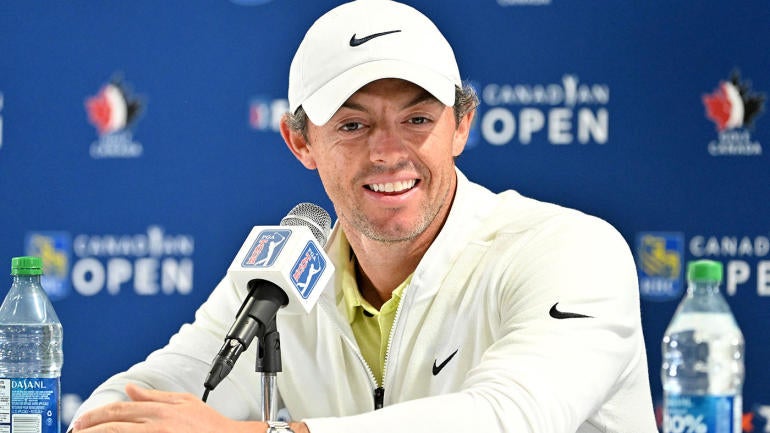
Before the most consequential golf-related press release of the last decade even landed Tuesday, there was no shortage of parties rushing to declare victory for their respective side. Some even declared victory for themselves. While not always explicit, the subtext was obvious. In interviews with Bryson DeChambeau and PGA Tour commissioner Jay Monahan or a plethora of reactionary tweets from others, the message was clear: We did this. Our actions got the golf world here. We brought value to the table. We won.
These claims will continue. During the U.S. Open next week at Los Angeles Country Club, folks will race to plant their flags in the winner's circle because this merger agreement between the PGA Tour, DP World Tour and Saudi Arabia's Public Investment Fund (which owns and operates LIV Golf) has implied that wheeling around the largest stack of money defines winning.
Then there was Rory McIlroy, who spoke Wednesday in a press conference he surely was not excited about. After a year of crusading for the the very organization that seemingly put a price upon his words, he was forced to field challenging questions about what in the world just happened and, with all the humility he could muster, admit that this was probably a good deal in the long term.
He cruised through the grilling with his usual grace -- sometimes clarifying, often resigned -- before finally saying what everyone has been thinking since the merger announcement: "It's hard for me to not sit up here and feel somewhat like a sacrificial lamb and feeling like I've put myself out there and this is what happens."
Rory always held all the cards. When this divide began well over a year ago, he could have ended it in 10 minutes. The nuclear football in the war between LIV Golf and the PGA Tour was the signature he's penned surely 100,000 times. With just one more stroke from the biggest prize in golf, the PGA Tour may well have staggered to an ignominious ending.
McIlroy never came close to putting pen to paper, though. He never capitulated, never caved, never wavered. He carried the Tour, won three times, lost to 14 total golfers at the four majors last year and probably should have won Executive of the Year in the process.
"What Rory has said and done are what leaders do," said Tiger Woods. "Rory is a true leader out here on Tour. The fact that he's actually able to get the things he said out in the public eye, be so clear minded with it and so eloquent with it, meanwhile go out there and win golf tournaments on top of that, people have no idea how hard that is to do -- to be able to separate those two things. Everyone respects him and they respect him because not just his ball-striking, his driving, but the person he is. He's been fantastic."
At the outset, McIlroy rejected Saudi overtures because he objected to the source of the funding for a rival league to the PGA Tour. At the 2020 Arnold Palmer Invitational, when LIV Golf was conceptualized as the Premier Golf League (which would have been financially backed by the Saudis but not necessarily run by them), McIlroy took the lead.
"I didn't really like where the money was coming from, either," he said at that time. "I wanted to be the first one to speak out against it. I'm glad that I have. I'm glad that I've done that."
Much has changed since that day, including McIlroy's position. As Saudi Arabia's PIF began slithering its tentacles into more sports across the athletic landscape, McIlroy's position on the source of the money softened even as his view of LIV Golf hardened.
While he didn't agree with LIV's disrupting presence, he started to view the Saudi money as an inevitability. He admitted as much in an interview with CBS Sports last summer, and he reiterated that stance Wednesday.
"The one thing I would say is, again, whether you like it or not, the PIF and the Saudis want to spend money in the game of golf," he said. "They want to do this, and they weren't going to stop. ... The thing for me, and this is the one thing that I've always thought about, how can we get that money into the game but use it the right way? And that's what this ultimately will do, hopefully. I mean, that's my hope."
There is a dark inevitability to the PIF. It gets what it want because the Saudis are willing to outspend any person or organization who try and stop them. Jay Monahan learned that lesson the hard way.
"It's very hard to keep up with people that have more money than anyone else," McIlroy noted.
There is a discreet but important difference between running to the Saudis, like Mickelson, and the Saudis inevitably running into you, like McIlroy. That's what happened this week with the PGA Tour as Monahan, alongside executives Jimmy Dunne and Ed Herlihy, coalesced their organization with the Saudis only to inform players after the fact.
That brings us back to this obsession with winners and losers, a game we love to play in which I am as culpable as anyone. Hooting and hollering about who got got and who came out on top. There is a never-ending war on Twitter and beyond about which side is going to end up at the center of the podium. There is chatter about whether Mickelson, DeChambeau, Dustin Johnson and Brooks Koepka walk away from the skirmish of the last year having won multiple ways -- taking huge paydays only to seemingly be welcomed back to the PGA Tour sooner or later.
Implicit in everything that has happened over the last year is the idea that the score is kept by money and money covers a multitude of sins. The gross part of the entire saga has been the revelation that there is a group of people who believe that a sum of money exists that can adequately fill the holes in our hearts and somehow offset the values we choose to kick away. That's a fool's errand, though, because it will never ever be enough. In the same way that a lower score cannot make up for breaking the rules of golf, no price can be put upon our principles.
Merger or not, nothing changed about the choices these players made. They ran towards the money and willingly or unknowingly chose to serve as chess pieces for PIF governor Yasir Al-Rumayyan to move around his board as Saudi Arabia sought to dig its way into another international sport.
Does McIlroy deserve credit for not allowing himself to become one of those chess pieces? That's up to you to decide. But he certainly deserves credit for toiling week after week doing the work his commissioner abdicated. His reward? Mickelson and friends walk away with hundreds of millions and get to return to the league McIlroy defended all along. Oh yeah, and that commissioner Rory defended? He's the one who made the deal.
The public scoreboard will say Mickelson won, but don't lose sight of how costly success was for Phil. He burned bridges, razed worlds, trolled online and generally lit his reputation on fire. He experienced true shame. At this year's Masters Champions Dinner, one of the great talkers in sports history never said a word. He was, at times, a man who traded what he couldn't afford to lose for something he could never keep.
He lost himself.
McIlroy, on the other hand, kept what he knew he could not lose.
A source shared with CBS Sports details from the players meeting Monahan held Tuesday. At one point in the meeting, McIlroy was goaded by a peer to show anger and frustration at everything that had happened. You should be the maddest one of all, this player noted.
Taking it all in, Rory calmly told him multiple times that he was perfectly happy with this outcome because his reputation remained intact.
Winning sometimes looks like losing when you refuse to lose yourself.
When McIlroy withdrew from the RBC Heritage earlier this year, he was fined $3 million for missing a second designated event. Justin Thomas, who has not made nearly as much as McIlroy but isn't exactly buying $10 bottles of wine, noted that no matter who you are or how much you have in the bank, $3 million is a ton of money.
Publicly and privately, McIlroy was adamant that it was worth it to kick away the $3 million "to get some other things in place." Rory is not governed by money. Not because he has more than he ever dreamed but because it's not the most important thing.
"Any decision that you make in your life that's purely for money usually doesn't end up going the right way," said McIlroy at last year's Canadian Open. "Obviously, money is a deciding factor in a lot of things in this world, but if it's purely for money ... it never seems to go the way you want it to."
In a world in which everyone is shouting, "We won! We won!" Rory sang a different tune Wednesday. Whether he's ultimately viewed as a sacrificial lamb, it's a role he has embraced. Being the sacrificial lamb is sometimes -- not always, but sometimes -- the entire point. Because some things simply matter more than our general definition of winning, and almost everything matters more than money.
If that's not a moral to this entire story, it may never land. So as Mickelson and others take their perceived victory lap leading the choir somewhere in the background, McIlroy remains off to the side, saying: I may have lost, yes, but I'm proud to have done so.
Rick Gehman is joined by Kyle Porter and Patrick McDonald to continue the discussion on the PGA Tour merging with the PIF and LIV Golf + previewing the RBC Canadian Open. Follow & listen to The First Cut on Apple Podcasts and Spotify.





















